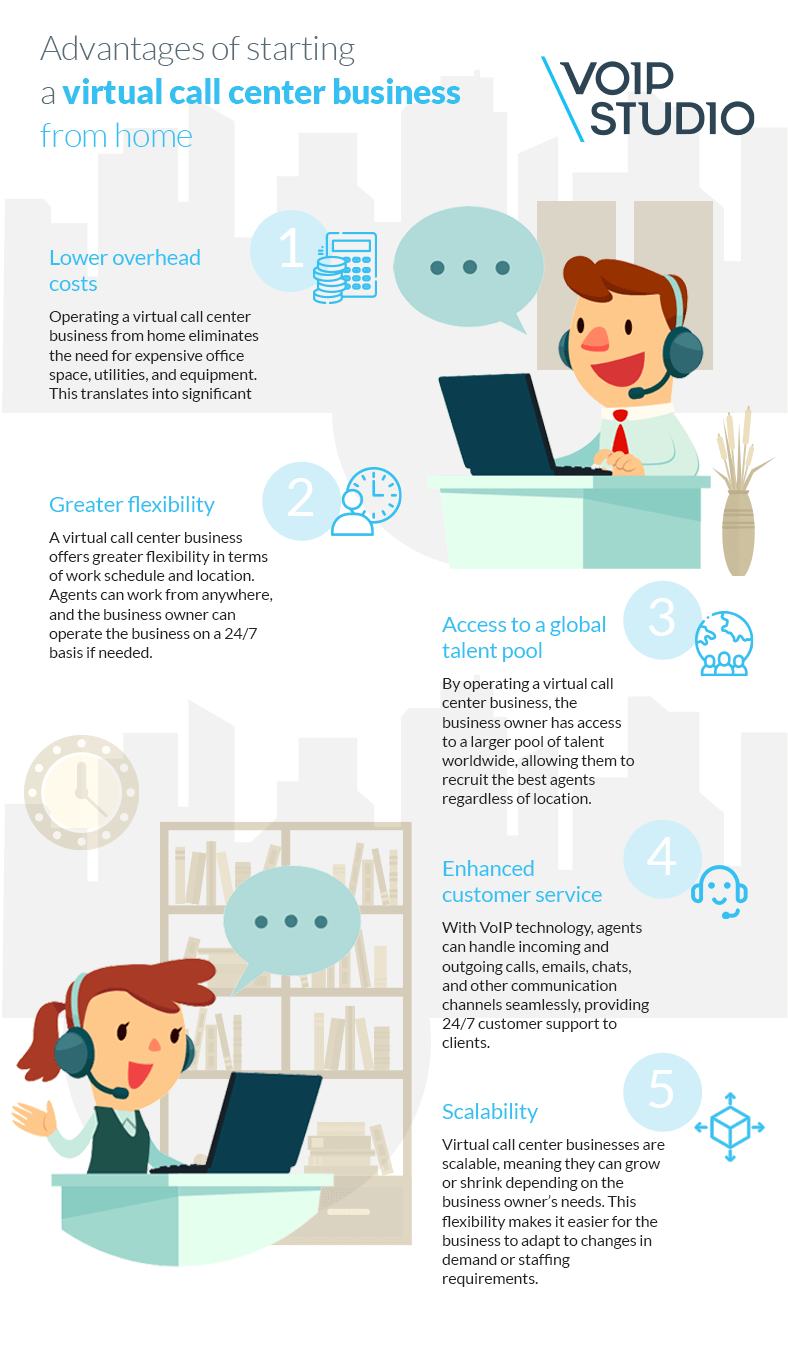
Table of contents
A virtual call center business is a type of call center that operates remotely, allowing agents to work from their homes rather than a traditional call center facility. This type of business offers a range of advantages for entrepreneurs, including lower overhead costs and greater flexibility.
This type of business utilizes advanced communication technology such as Voice over Internet Protocol (VoIP) to handle incoming and outgoing calls and other communication channels like email, chat, and social media.
Starting a virtual call center business from home can be an ideal option for those who want to be their boss and have the freedom to work from anywhere. A one-person call center business can be profitable and sustainable with the right technology and resources.
This guide will discuss the definition of a virtual call center business and the advantages of starting one from home. We will also explore the types of call center businesses that one person can operate from home, including customer service, tech support, sales, and more.
Advantages of starting a virtual call center business from home
Starting a virtual call center business from home offers several advantages for entrepreneurs, including:
A virtual call center business from home can provide a cost-effective and flexible solution for entrepreneurs looking to provide high-quality customer support and grow their businesses.
Types of call center businesses that can be operated from home
These are just a few examples of the many call center businesses that can be operated by one person from home:
- Virtual receptionist service: A virtual receptionist service can be run from home by a single person using a VoIP phone system with call routing and answering features. The virtual receptionist can answer calls on behalf of small businesses and handle their customer inquiries, appointments, and other administrative tasks.
- Telemarketing service: A telemarketing service can be operated by a single person from home using a VoIP phone system with outbound calling features. The telemarketer can reach potential customers, promote products or services, and generate business leads.
- Customer support service: A customer support service can be managed by a single person from home using a VoIP phone system with call center features such as call queuing, IVR, and call recording. The customer support representative can handle customer inquiries, troubleshoot technical issues, and provide product or service information to customers.
- Technical support service: A technical support service can be operated by a single person from home using a VoIP phone system with advanced call center features like screen sharing and video conferencing. The technical support representative can remotely troubleshoot software or hardware issues, assist customers with product installations, and provide technical guidance.
- Answering service: An answering service can be run by a single person from home using a VoIP phone system with live answering features. The service representative can answer calls on behalf of businesses and provide general information, take messages, and forward calls per the client’s requirements.
- Psychic readings service: A psychic readings service can be operated by a single person from home using a VoIP phone system with call center features like call recording and scheduling. The psychic reader can offer clients tarot readings, astrology readings, or other types of psychic services.
- Counseling and therapy service: A counseling and therapy service can be run by a single person from home using a VoIP phone system with video conferencing and screen-sharing features. The counselor or therapist can offer remote counseling sessions to clients, helping them with mental health issues or life challenges.
- Translation service: A single person from home can manage a translation service using a VoIP phone system with call recording and file transfer features. The translator can provide remote translation services to clients, translating documents or interpreting calls in different languages.
- Personal shopping service: A personal shopping service can be run by a single person from home using a VoIP phone system with live chat or messaging features. The personal shopper can communicate with clients remotely, helping them with shopping tasks, providing advice, or making purchases on their behalf.
- Bookkeeping service: A single person can operate a bookkeeping service from home using a VoIP phone system with call recording and accounting software integration features. The bookkeeper can provide remote bookkeeping services to clients, helping them manage their finances and accounting tasks.
How to start a virtual call center business from home
Creating a virtual call center business from home requires careful planning and preparation. Here are the steps you need to follow:
Step 1: Identify your niche and target market
Identifying your niche and target market is critical when starting a virtual call center business from home. It involves determining the specific type of call center business you want to operate and understanding the unique needs of your target customers. By doing so, you can tailor your services to meet their specific needs, which will increase customer satisfaction and help your business stand out from the competition.
To identify your niche, consider your expertise, skills, and interests. For example, if you have experience in customer service, you may want to start a call center business that focuses on providing exceptional customer support. Alternatively, if you have a passion for sales, you may want to create a call center specializing in telemarketing or lead generation.
Once you’ve identified your niche, defining your target market is essential. This involves researching your potential customers’ demographics, such as age, gender, location, and income level, as well as their needs and pain points. By doing so, you can develop a deep understanding of your customers and tailor your services to meet their specific needs. This will increase customer satisfaction and help you target your marketing efforts more effectively, which will help your business grow over time.
Step 2: Set up your home office
Setting up a dedicated home office is crucial to starting a virtual call center business from home. It provides a quiet and comfortable environment to work in, which is essential for productivity and maintaining a professional image when communicating with clients or customers.
Here’s a list of equipment and aspects to consider when setting up your home office for a virtual call center:
- Computer: A reliable desktop or laptop computer is essential for virtual call center work.
- High-Speed internet connection: A fast and reliable internet connection ensures clear communication during calls.
- Headset: A good-quality headset is necessary to communicate with clients or customers and minimize background noise.
- Desk: A sturdy and comfortable desk will provide a dedicated workspace.
- Chair: A comfortable and ergonomic chair is essential for prolonged periods of sitting.
- Webcam and microphone: While it’s true that most desktop computers come with a built-in webcam and microphone, the quality of these components can vary greatly. For a virtual call center business, it’s essential to have high-quality audio and video to ensure clear communication with clients and customers. Additionally, having separate equipment can allow for more flexibility in placement and positioning, improving the overall user experience.
- Proper lighting: A well-lit workspace is important for productivity and reducing eye strain.
- File storage: Keep your work organized with file storage options such as cabinets, drawers, or shelves.
- Printer and scanner: These are useful for printing and scanning documents.
- Software: Depending on the call center software you’ll use, you may need to purchase or install specific software programs.
- Permits or licenses: Check with your local authorities to determine if you need any permits or licenses to operate a virtual call center business from home.
With proper planning and allocation of time and resources, you can ensure that your home office is a safe and productive workspace, helping your virtual call center business to thrive.
Step 3: Choose a VoIP provider with call center features
Choosing the right VoIP provider is crucial when setting up a virtual call center. A VoIP provider with call center features can provide the necessary tools and services to manage calls efficiently. Look for a provider that offers features such as call queuing, call routing, call recording, and real-time reporting.
Also, it is important to consider other key factors. First and foremost, the provider must offer support in your language, so you can communicate effectively with them if any issues arise.
In addition to language support, look for a provider that offers a wide range of geographical and non-geographical numbers worldwide, especially if you plan to offer your services globally. Make sure the provider can easily configure these numbers for you and that the quality of calls is high.
Another important aspect to consider is advanced features such as IVR (Interactive Voice Response), integrations with other software, and other tools to enhance the overall functionality of your virtual call center. Ensure the provider can offer these features that align with your business needs. Finally, it’s a good idea to read reviews and compare pricing plans to find the best fit for your budget and requirements.
Step 4. Set up your VoIP phone system
Setting up your VoIP phone system is a crucial step in starting your virtual call center business. As we have previously stated, choosing a reliable VoIP provider with call center features is key to the success of your business. Once you have selected a provider, they will assist you in setting up your VoIP phone system to ensure that it meets the specific needs of your business.
During the setup process, you must configure your call routing settings, set up extensions for your agents, and customize your IVR (Interactive Voice Response) system. It’s important to ensure that your VoIP phone system is configured correctly to handle incoming and outgoing calls and integrates seamlessly with any additional software or tools you plan to use in your business.
With the help of your VoIP provider, setting up your phone system should be a smooth and easy process, allowing you to focus on providing excellent customer service to your clients.
Step 5: Develop a business plan
Developing a solid business plan and marketing strategy is crucial for the success of any virtual call center business. A business plan will help you define your goals, outline your services and pricing, determine your target market, and identify your competitive advantages. It will also help you anticipate challenges and develop strategies to overcome them.
Your marketing strategy should focus on building brand awareness and attracting potential clients. This can include creating a website, social media presence, and other forms of online marketing. You can also attend industry conferences and events, network with other professionals in your field, and offer promotional discounts to attract new clients.
Continuously evaluate and adjust your marketing strategy based on the results you’re seeing and the feedback you receive from your clients. With a well-developed business plan and marketing strategy, you’ll be better equipped to succeed in the competitive virtual call center business world.
Self-running a virtual call center business
Running a virtual call center business by yourself requires a lot of multitasking and efficient time management skills.
To handle customer inquiries, appointments, and other administrative tasks, you should have a system for organizing and prioritizing your work. Utilize a customer relationship management (CRM) software to track customer information, appointments, and inquiries.
Set up a scheduling system to ensure appointments are set and kept, and assign priority levels to tasks to ensure they are completed on time. Staying on top of administrative tasks is important to ensure customer satisfaction and maintain a professional image.
To effectively manage your time and productivity, establish a routine and stick to it. Set specific work hours and break times and avoid distractions during work hours.
Utilize time management techniques such as the Pomodoro method, which involves working for 25-minute intervals and taking a five-minute break in between. Take care of yourself physically and mentally to maintain productivity and avoid burnout. Take regular breaks, exercise, and practice stress management techniques.
As your business grows, you may need to incorporate new agents to handle the increased workload. Consider hiring remote agents to work from their homes. Set up a system for training and managing remote agents, including providing them with the necessary equipment and software. Utilize collaboration tools such as video conferencing and project management software to stay connected with your team and ensure efficient communication.
Processes and procedures
Establishing processes and procedures is essential for the success of a virtual call center business. It involves defining call-handling processes and procedures, developing scripts and guidelines for agents (even if you are the only agent), and establishing quality assurance procedures.
Defining call-handling processes and procedures involves creating a set of guidelines for handling different types of calls, such as customer inquiries or sales calls. This ensures that all calls are handled consistently and provides a standardized customer experience.
Developing scripts and guidelines is also important. It helps ensure that agents deliver the right message and present a consistent brand image. This can include guidelines for how to handle demanding customers or how to give sales pitches.
Establishing quality assurance procedures involves monitoring calls to ensure that you or the agents you hire follow procedures and deliver quality customer service. This can include regular call monitoring, customer feedback surveys, and agent performance evaluations. By establishing quality assurance procedures, you can identify areas for improvement and ensure that you are delivering a high level of customer service.
Monitor and measuring performance
Whether you have hired agents or are a solo agent, it’s essential to monitor and measure performance to ensure the success of your virtual call center business.
Setting performance metrics and goals is crucial to evaluate the effectiveness of your call center. If you have hired agents, clearly communicate your expectations and provide regular feedback and coaching to help them improve their performance.
In addition to setting metrics and goals, you must monitor and measure performance using analytics and reports. This data can help you identify areas where your business excels and areas that need improvement.
This information can be used for solo agents to fine-tune their processes and improve the customer experience. For businesses with agents, this information can be used to provide agents feedback and improve the call center’s overall performance.
Conclusion
Starting a virtual call center business from home can be a challenging but rewarding venture. By identifying your niche and target market, setting up your home office, choosing a VoIP provider with call center features, developing a business plan and marketing strategy, and establishing processes and procedures, you can successfully run a virtual call center business by yourself or with a team of remote agents.
Monitoring and measuring performance is also crucial, whether you have hired agents or you are a solo agent. By setting performance metrics and goals, monitoring and measuring performance using analytics and reports, and providing regular feedback and coaching to agents, you can ensure that your virtual call center business is operating efficiently and effectively.
The future growth opportunities for virtual call center businesses are vast, with the potential to expand globally and provide services to clients all over the world.
As a recommendation, we suggest trying out VoIPstudio for your virtual call center needs. With its user-friendly interface, advanced features, and dependable support in various languages, VoIPstudio can assist in elevating your virtual call center business to the next level.
More from the blog
Want to improve your business communication?
Unlock enterprise-class call center power at affordable prices – no hardware, no delays, no surprises!







